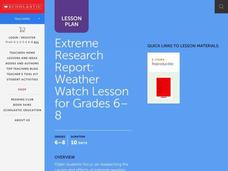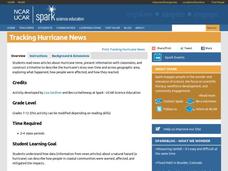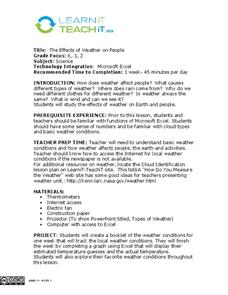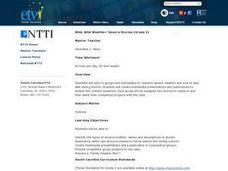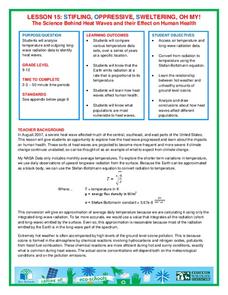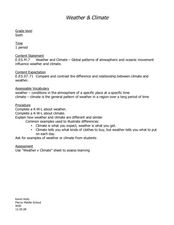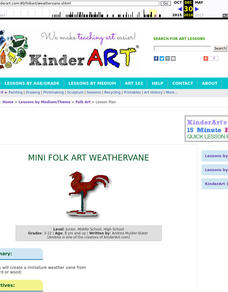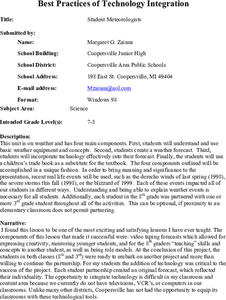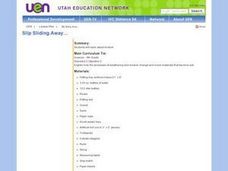Curated OER
Extreme Research Report
Investigate weather facts and figures to determine what has caused particular climate conditions. Research air pressure, temperature, wind, and humidity. Conduct online research to determine what air pressure, wind, temperature, and...
Center Science Education
Tracking Hurricane News
Here is a unique twist for your lesson on hurricanes. After examining extreme weather news headlines, your storm chasers view a PowerPoint about hurricanes and then zoom in on Hurricane Irene. They map a timeline of her trek up the East...
Curated OER
Brochure Writing: Severe Weather Patterns
Students observe weather patterns. They reserach important facts about severe weather. Using computer technology, students create a detailed brochure explaining six severe weather patterns.
Teach Engineering
Weather Forecasting
According to the Farmers' Almanac, the weather will be nice today. Class members examine how weather forecasting plays a part in their lives with a resource that provides information on the history of forecasting, from using cloud...
Curated OER
The Effects of Weather on People
Students discover the causes of different types of weather and it's effect on society. In this environmental lesson, students utilize the Internet to examine cloud types, normal weather conditions and the type of weather considered...
Curated OER
Weather Watch
Young scholars complete a series of lessons in which they study daily weather patterns and examine extreme weather conditions. They complete activities that range from visual observation of daily weather to building a weather station and...
Curated OER
Wild, Wild Weather: Severe Storms
Second graders research dangerous weather and how they can stay safe. In this environment lesson, 2nd graders view video clips and research the Internet to identify the different types of severe weather storms. Students complete a...
Curated OER
Writing and Editing a Research Report
Students research report on their severe weather pattern for presentation to the class.
UAF Geophysical Institute
Observing the Weather
How can you predict the weather without any technology? Young scientists learn to forecast the weather using traditional Native American techniques. Based on their observations of the weather, as well as talking to their classmates, they...
Curated OER
Our Savage Planet in the News
Students explore extreme earth phenomenons. In this savage planet instructional activity, students explore and report on various types of severe weather and earth phenomenons using the Internet, a word processor, or other multimedia device.
Curated OER
Severe Weather Planning
Fourth graders research the need to prepared for a severe weather event. They select one type of weather condition and explain how to be prepared in a report.
Curated OER
Differences between Climate and Weather
Students collect weather data over weeks, graph temperature data and compare the temperature data collected with averaged climate data where they live.
Curated OER
Classroom Meteorologists: An Experiential Approach to Learning about Seasons and Weather
Students examine several concepts about weather in the seven lessons of this unit. This year long activity helps students to gather data seasonally about wind, clouds, precipitation, and temperature. Earth's three climate zones are...
Curated OER
Temperature and Tracking Weather
Fourth graders discuss, describe and track weather by utilizing a variety of measurable quantities as temperature, wind speed, wind direction, cloud conditions and precipitation. They assess, through experiments and practicing, how to...
Curated OER
Drought Threatens Huge Man-Made Lake
Students locate Lake Mead, then read a news article about Lake Mead drying up and how that would effect water and power supplies to the region. In this current events lesson, the teacher introduces the article with a map and vocabulary...
National Wildlife Federation
Stifling, Oppressive, Sweltering, Oh My!
Looking for a hot date? Pick any day in August, statistically the hottest month in the United States. The 15th lesson in the series of 21 instructs pupils to investigate the August 2007 heat wave through NASA data, daily temperature...
Curated OER
Fact Or Fiction
Young scholars demonstrate their ability to distinguish between fact and fiction. Students identify the features of weather-related adages and proverbs. After reviewing several weather adages, young scholars explain whether they are...
Curated OER
Weather/Climate
Students examine traditional Native American weather/climate knowledge. They keep a weather journal and research cloud cover.
K20 LEARN
Water We Going To Do? Floodplains And Watershed Management
How has human activity affected Earth's watersheds? An action-packed lesson plan, part of the K20 Center, examines water's ability to go with the flow regardless of what is in its path. Scholars build model watersheds, examine time-lapse...
Curated OER
Forces of Change
Second graders discuss various ways in which landforms change over time. They, in groups, research and create a reference book about landform change including tsunamis, earthquakes, weathering, erosion and volcanic eruptions.
Curated OER
Folk Art Weather Vane
Students observe weather vanes and explore their purpose and history and create a miniature weather vane from cardboard or wood.
Curated OER
Student Meteorologists
Students complete a unit about weather and meteorology. They read the book "The Big Storm," use weather equipment, view local weather reports, and create a weather forecast that is videotaped and presented to a younger class.
Curated OER
Erosion: Slip Sliding Away
Fourth graders investigate the causes of erosion. Through several demonstrations including one using sugar cubes and warm water, they observe the effects of erosion. In groups, 4th graders conduct similar experiments and record their...
Curated OER
How Do Storms Influence Our Lives?
Students investigate the various ways storms influence our lives. They conduct Internet research, identify the characteristics of different storms, plot storm coordinates, and write a report on a particular storm.


